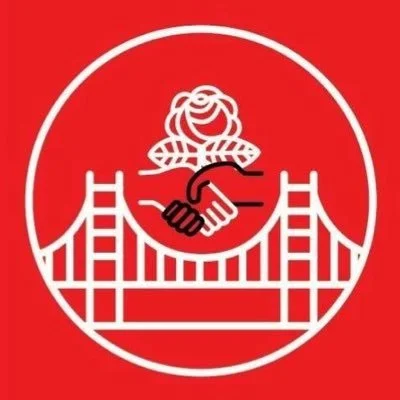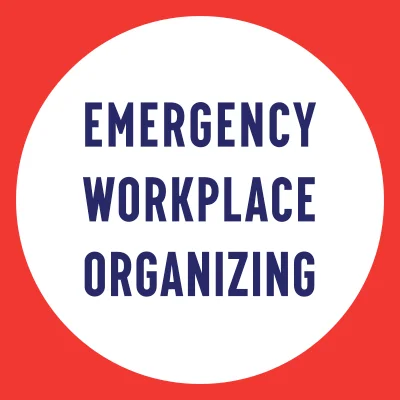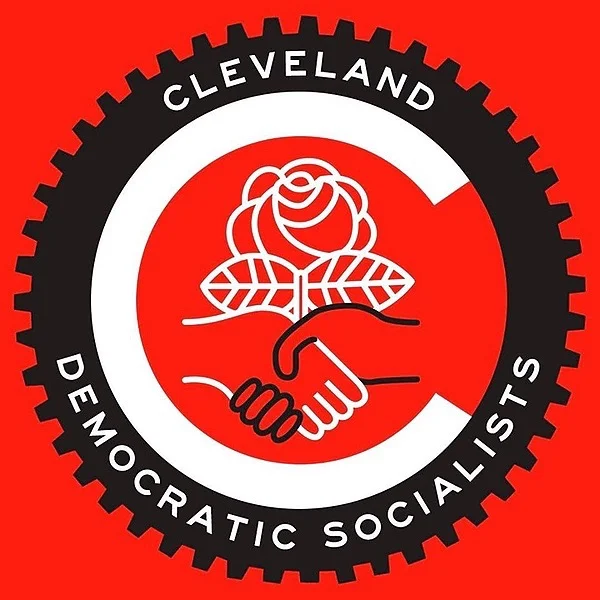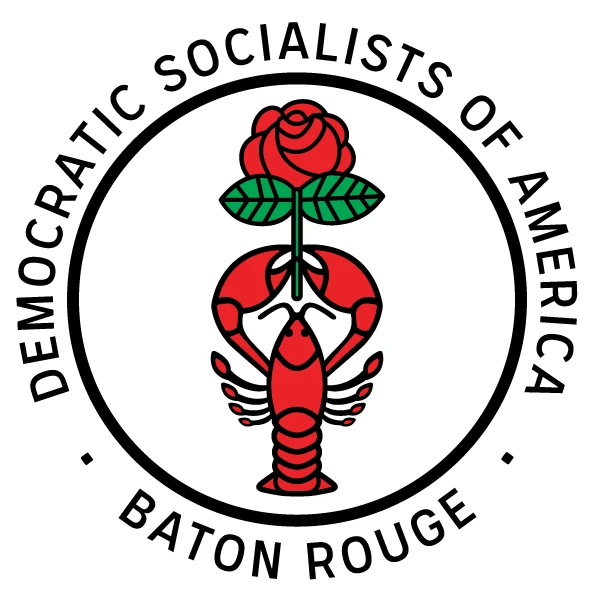

Weekly Roundup: January 13, 2026
Events & Actions
Events with a  are especially new-member-friendly!
are especially new-member-friendly!
 Tuesday, January 13 (6:30 PM – 7:30 PM): Ecosocialist Bi-Weekly Meeting (Zoom & in person at 1916 McAllister St)
Tuesday, January 13 (6:30 PM – 7:30 PM): Ecosocialist Bi-Weekly Meeting (Zoom & in person at 1916 McAllister St)
 Tuesday, January 13 (7:00 PM – 8:30 PM): EWOC Fundamentals of Workplace Organizing Training (Zoom & in person at 1916 McAllister St)
Tuesday, January 13 (7:00 PM – 8:30 PM): EWOC Fundamentals of Workplace Organizing Training (Zoom & in person at 1916 McAllister St)
 Wednesday, January 14 (6:45 PM – 9:00 PM): DSA SF General Meeting (Kelly Cullen Community, 220 Golden Gate Ave)
Wednesday, January 14 (6:45 PM – 9:00 PM): DSA SF General Meeting (Kelly Cullen Community, 220 Golden Gate Ave)
 Thursday, January 15 (5:30 PM – 6:30 PM):
Thursday, January 15 (5:30 PM – 6:30 PM):  Education Board Open Meeting (Zoom)
Education Board Open Meeting (Zoom)
 Thursday, January 16 (9:30 AM – 10:30 AM):
Thursday, January 16 (9:30 AM – 10:30 AM):  District 1 Coffee with Comrades (Breck’s, 2 Clement St)
District 1 Coffee with Comrades (Breck’s, 2 Clement St)
 Saturday, January 17 (6:00 PM – 8:00 PM):
Saturday, January 17 (6:00 PM – 8:00 PM):  HWG Food Service (Castro St & Market St)
HWG Food Service (Castro St & Market St)
 Sunday, January 18 (11:00 AM – 1:00 PM):
Sunday, January 18 (11:00 AM – 1:00 PM):  No Appetite for Apartheid Consumer Pledge Canvass (Outer Sunset Farmer’s Market & Mercantile, 1994 37th Ave)
No Appetite for Apartheid Consumer Pledge Canvass (Outer Sunset Farmer’s Market & Mercantile, 1994 37th Ave)
 Sunday, January 18 (1:00 PM – 3:00 PM):
Sunday, January 18 (1:00 PM – 3:00 PM):  SF EWOC Flyering (TBD)
SF EWOC Flyering (TBD)
 Monday, January 19 (6:30 PM – 8:00 PM): Homelessness Working Group Regular Meeting (Zoom & in person at 1916 McAllister St)
Monday, January 19 (6:30 PM – 8:00 PM): Homelessness Working Group Regular Meeting (Zoom & in person at 1916 McAllister St)
 Monday, January 19 (6:30 PM – 7:30 PM):
Monday, January 19 (6:30 PM – 7:30 PM):  DSA Run Club (McClaren Lodge)
DSA Run Club (McClaren Lodge)
 Tuesday, January 20 (6:00 PM – 7:00 PM): Social Housing Meeting
Tuesday, January 20 (6:00 PM – 7:00 PM): Social Housing Meeting  (Zoom & in person at 1916 McAllister St)
(Zoom & in person at 1916 McAllister St)
 Wednesday, January 21 (6:00 PM – 7:30 PM):
Wednesday, January 21 (6:00 PM – 7:30 PM):  What Is DSA? (In person at 1916 McAllister St)
What Is DSA? (In person at 1916 McAllister St)
 Thursday, January 22 (6:30 PM – 9:00 PM): DSA Board Game Night (TBD)
Thursday, January 22 (6:30 PM – 9:00 PM): DSA Board Game Night (TBD)
 Thursday, January 22 (6:30 PM – 7:30 PM): Public Bank Meeting (TBD)
Thursday, January 22 (6:30 PM – 7:30 PM): Public Bank Meeting (TBD)
 Thursday, January 22 (7:00 PM – 8:00 PM): Immigrant Justice Working Group Meeting (Zoom & in person at 1916 McAllister St)
Thursday, January 22 (7:00 PM – 8:00 PM): Immigrant Justice Working Group Meeting (Zoom & in person at 1916 McAllister St)
 Friday, January 23 (7:00 PM – 9:00 PM):
Friday, January 23 (7:00 PM – 9:00 PM):  Maker Friday (In person at 1916 McAllister St)
Maker Friday (In person at 1916 McAllister St)
 Saturday, January 24 (11:00 AM – 1:00 PM):
Saturday, January 24 (11:00 AM – 1:00 PM):  Physical Education + Self Defense Training (In person at Kelly Cullen Community, 220 Golden Gate Ave)
Physical Education + Self Defense Training (In person at Kelly Cullen Community, 220 Golden Gate Ave)
 Sunday, January 25 (5:00 PM – 6:00 PM):
Sunday, January 25 (5:00 PM – 6:00 PM):  Tenderloin Healing Circle Working Group (Zoom)
Tenderloin Healing Circle Working Group (Zoom)
 Monday, January 26 (6:00 PM – 8:00 PM):
Monday, January 26 (6:00 PM – 8:00 PM):  Tenderloin Healing Circle (In person at Kelly Cullen Community, 220 Golden Gate Ave)
Tenderloin Healing Circle (In person at Kelly Cullen Community, 220 Golden Gate Ave)

SF EWOC Flyering
Our next NA4A consumer pledge canvass will be on Sunday, January 18th from 11:00 AM to 1:00 PM at the Outer Sunset Farmer’s Market! We’ll meet at 37th and Ortega. This will be the first consumer pledge canvass of 2026, so let’s kickstart the year on a high note and continue our momentum from 2025 on making SF apartheid-free! RSVP HERE.

 Maker Friday
Maker Friday
Come make with us on January 23rd from 7:00 PM to 9:00 PM at the 1916 McAllister office! We’ll be making buttons and zines. Masks required and provided. All are welcome, no experience necessary, see you there!

Emergency Tenant Organizing Committee (ETOC) Fundamentals of Tenant Organizing Watch Party
Join DSA SF’s Tenant Organizing Working Group for the Emergency Tenant Organizing Committee (ETOC) Fundamentals of Tenant Organizing course. We will gather to watch this training over four Saturdays in February. The first session is Saturday, February 7th 11:00 AM – 2:00 PM at 1916 McAllister.

NO ICE, NO WAR – DSA Brings Out Hundreds in San Francisco Protest
On Saturday, our chapter co-organized an emergency protest against Trump’s illegal and imperialist war on Venezuela and to demand the abolition of ICE. Alongside our comrades in East Bay DSA, we organized the rally and march within 72 hours, following a national call by the Democratic Socialists of America where our own chapter member, Savannah K., spoke.
This was the first local DSA-led protest and march since 2019. We sent out an email and text message to all chapter members, and organized flyering throughout the Mission, Bernal Heights, Divisadero, Civic Center, the Sunset, and parts of Oakland. Over 1,000 people showed up to attend the rally and march that began at 24th Street BART Plaza San Francisco. The plaza was flooded with red banners, handmade protest signs, and roaring chants in a powerful display of international solidarity with the Venezuelan people. Hazel W. from our chapter and NPC member kicked off the speeches that tied the imperialist attack on Venezuela with the violence playing out on our streets at home. “That same empire reaping violence abroad brings terrorism back home. They murdered Renee Good in Minneapolis. A mother shot down by ICE. They kill our mothers here and bomb mothers in Caracas. They jail our fathers here at home and murder them in Gaza. This is not a coincidence. This is a strategy. They divide us by borders so we don’t see our common enemy.”
We hosted speakers from the Party for Socialism and Liberation, Palestine Youth Movement, Nodutdol, Trabajadores Unidos Workers United, autonomous court defenders, San Francisco Committee for Human Rights in the Philippines, Committee in Solidarity with the People of El Salvador, Haiti Action Committee, and BAMN. The entire march, we saw a news helicopter circling above, and received coverage from ABC 7 News, KQED, and the San Francisco Chronicle. Our comrades produced our own media posted on our social media channels featuring protest attendees and DSA members.
While a nearby protest organized by Indivisible centered on ICE violence at home, protesters at the No War, No ICE protest emphasized the interconnectedness of both struggles. The No War, No ICE protest sent a clear message that ICE is doing exactly what it was designed to do: terrorize vulnerable workers with impunity. ICE operates hand in hand with the U.S. military and prison industries to create displacement through sanctions, austerity, and war, and then re-victimize migrants as exploitable labor once they arrive in the United States.
The San Francisco and East Bay DSA chapters, along with chapters nationwide, pledge to continue organizing against U.S. imperialism, to oppose unchecked executive war powers enabled by Congress, and to stand in unwavering solidarity with the Venezuelan people, immigrants, workers, and oppressed communities everywhere. To learn more about Venezuela, view this F.A.Q. There has never been a greater moment to join the Palestine Solidarity and Anti-Imperialist working group within our chapter. Join the #palestine-solidarity channel on Slack to get started.
Reportback: EWOC Fundamentals of Workplace Organizing Week #1
Last Tuesday we held our first session of the four-week-long Emergency Workplace Organizing Committee (EWOC) course Fundamentals of Workplace Organizing. Our group met in person at 1916 McAllister to watch the course plenary before diving into a discussion about the material we covered. This week’s topic was “Developing Leadership” and we heard from a federal worker organizer at Glacier National Parks. They spoke about the challenges of organizing in such a large geographic area with little cell service and how identifying leaders in each spread out department was absolutely key. Part of the lecture talked about the importance of charting your workplace, and it was interesting to hear how Glacier National Parks has different charts for the summer and non-summer seasons due to changes in the number of seasonal workers.
The next session will take place on Tuesday, January 16th at 7:00 PM, hosted at 1916 McAllister. It’ll cover the steps of the organizing conversation, a critical skill for organizing in any environment!
If you’d like to get involved with the SF local chapter of EWOC, reach out to the lead coordinator Caitlin S or email labor@dsasf.org. EWOC is a standing topic at meetings of the Labor Board, which are held every other Monday at 7:00 PM, both in-person at 1916 McAllister and over Zoom. Anyone is welcome to attend, and we’re always looking for people interested workplace lead canvassing, organizer trainings, and volunteer outreach. If you’re interested in organizing your workplace and would like to be connected with an EWOC organizer, fill out the request form here.



What is a labor lockout?
A labor lockout is an effort by bosses to block workers from working in the midst of a labor dispute.
The post What is a labor lockout? appeared first on EWOC.


A Moment for Renee Nicole Good
Author: Mike Z
On Wednesday in Minnesota an innocent poet, journalist, and mother of three children was murdered in cold blood by a masked ICE thug. Renee Nicole Good was acting as a legal observer to the ICE raid in question, taking on an extremely important role in documenting the abuses our government inflicts upon us. This woman was just like you or me — an average person who is doing their part to try and help their neighbors in these dark and tumultuous times as our rights and liberties are stripped away and infringed upon daily.
There was a doctor on the scene who was denied access to Renee Good and held at gunpoint. Had the doctor been allowed to reach her, potential life saving care could have been performed. When the paramedics arrived, much like how Israel does when they brutalize a population in the West Bank or Gaza, they were denied access to Renee. They were then forced to walk on foot to retrieve her limp body to transfer to a location where she could be given treatment on the way to the hospital. She was pronounced dead upon arrival, succumbing to her wounds.
Renee Good’s life was stolen. Make no mistake with how the media is trying to spin this narrative, there was no justifiable reason to brutalize this woman, much less murder her in cold blood. There is no conceivable way to interpret the evidence we have in any other way than willful execution of a civilian by the state.
It is a tragedy that three children, ages 6, 12, and 15, will now grow up without their mother. A six year old child has been made an orphan as a result of this sick transgression. This is someone who could have been the person in front of you in line as you wait in the grocery store checkout with your food for dinner. This family and the communities they inhabit will feel this loss for the rest of their lives. It is an abject tragedy that we cannot come together in the wake of such senseless violence to condemn an action that never should have happened in the first place. Her absence will be felt by many.
Renee Good is not the first person to have been brutalized or slaughtered by ICE and will assuredly and unfortunately not be the last. While other instances of violence lack the damning video documentation that Good’s execution had, that does not diminish the impact of them in any way. Just one day after her murder ICE agents opened fire on 2 civilians in Portland and wounded them – luckily as of now both victims have survived. On New Year’s Eve an off duty ICE agent murdered a man in Los Angeles for firing off gunshots in celebration. All of this and more happened just in the first two weeks of 2026!
2025 was the deadliest year in the history of ICE – no less than 32 innocent people were murdered by their hands. And that doesn’t even begin to touch on the other various heinous crimes committed on the civilian population from sexual assault to unlawful and brutal incarceration. No doubt more incidents such as these are happening right now. I wish I could tell you things were going to get better, but I think the hard reality is we are in for things to get much worse. The state will be ever emboldened by this development as large swaths of the nation seemingly have been propagandized into not believing their own eyes. As the media manufactures consent for further acts of brutality on the civilian population we enter a new and frightening chapter of the fascist takeover of the United States of America.
With the imperial boomerang quickly finding its way back home, now more than ever we need to be standing with one another as community members with intertwined destinies. It should be clear to us with these startling developments in our country that no single individual will be able to stop these masked thugs from going neighborhood to neighborhood, door to door, acting with unaccountable impunity against our friends and family. The only way we can demand justice for these heinous crimes is collectively. Our government does not care about our outcry as individuals, but together we can make our voices heard in ways that none of us could ever hope to do on our own.
The most important thing for us to be doing at this moment is bolstering the human connections that bind our communities together. If our government will not defend us from an armed Gestapo, we must work to build those defenses together. Find local protests in your area to make your righteous anger known, join in on pressure campaigns to demand condemnation of ICE from our elected officials, help with rapid response networks tracking ICE’s actions in your area, engage in mutual aid to help the families of victims in your neighborhoods, or join an organization working to change the political character of this nation like the Democratic Socialists of America. Together we must stand as one in our quest for justice and rebuke this blatant assault on our base freedoms. We must refuse to allow the tragic martyring of those victims of ICE like Renee Good to be for nothing and ensure that it not be allowed to happen again.
The post A Moment for Renee Nicole Good appeared first on Democratic Socialists of America.


The socialist imperative to reject AI



Join us Monday, 12th: ICE Out For Good!

ICE Out For Good
This Monday, January 12, join us to demand ICE Out For Good! Justice for all those harmed and killed by ICE! We will rally at 3:30 PM at Columbus Circle, then march at 4:30 PM to Clinton Square, where a vigil will follow. Our community stands together against detention, deportation, and the violence ICE inflicts. Syracuse refuses to be silent. Show up, bring friends, share this post, and stand in solidarity!


Melt the Ice Contracts: Success on the Horizon
Avelo Airlines announced it will cease its Department of Homeland Security (DHS) charter service that transports detainees for the Trump administration, closing its Mesa, Arizona base on January 27. The budget carrier said the program had delivered only “short‑term benefits” but failed to provide enough predictable revenue to offset the operational complexity and costs involved. Avelo’s spokesperson, Courtney Goff, confirmed the move in an email to the New Haven Independent, noting that the airline began running deportation flights from Arizona last May amid growing backlash.
The decision follows months of protests and a boycott movement led by groups such as Connecticut Students for a Dream (C4D), the New Haven Immigrants Coalition, Unidad Latina en Acción, and the Democratic Socialists of America. Activists condemned the airline’s participation in what they described as “sloppy, dangerous” deportation flights, citing an American Prospect report that highlighted safety lapses. Pastor Jack Perkins Davidson warned that “human suffering is not profitable,” while Tabitha Sookdeo emphasized how community organizing and refusal to patronize harmful practices can force corporations to change. CEO Andrew Levy had previously defended the contracts on financial grounds, arguing they were essential to keep Avelo’s New Haven operations running.
https://www.newhavenindependent.org/2026/01/07/avelo-to-exit-deportation-biz/


Member of PSOL in Brazil Visits Madison DSA
by Kristen B.
In December 2025, MADSA was visited by Peter B., a Brazilian socialist member of PSOL (Partido Socialismo e Liberdade/Socialism and Liberty Party). Peter has been living in New York for the past year and paid a visit to Madison, Wisconsin, as part of his effort to promote the First International Antifascism Conference, being held in Porto Alegre, Brazil, from March 26-29, 2026. This conference is being organized by his party, PSOL, as well as PT (Worker’s Party; party of current president Lula da Silva) and PC do B (Communist Party of Brazil).
Peter has been an active socialist organizer in Brazil for many years and officially joined PSOL in 2009. Before joining PSOL, Peter was active in the student movement, as well as the broader youth movement in Brazil. He also worked as the chief of staff for a Brazilian congresswoman. Comrades in MADSA sat down with Peter for an intimate talk about what it has been like for Peter living in the United States and observing the actions of DSA. We also engaged in conversation about electoral politics, the rise of the far-right, the importance of internationalism, the various ways PSOL differs from DSA, and the differences between our respective countries.
PSOL is the second largest left party in Brazil and is positioned to the left of PT, the Workers Party. PT is the current largest left party, but is not an openly socialist party. PSOL currently has 12 congress members in Brazil out of a congress of over 500 members.
Brazil and the United States
In the spirit of internationalism, Peter expressed that he and his comrades in Brazil are concerned about the rise of right-wing politics in the United States. They are especially concerned about the politics of Trump and the far-right. The realities of Brazil and the United States are intertwined, with far-right sentiment becoming a growing problem in both countries, as well as around the world. With these concerns in mind, socialists are frequently asking themselves: What are the best actions socialists can be taking to combat fascism in their country? For American socialists, do we feel DSA is prepared nationally to combat these issues? What about the issues in our local communities and how they are connected to international politics?
If Americans think their recent political issues are unique to their own country – everything from political assassinations to coup attempts – Brazil is more alike than most might know. Jair Bolsonaro, previously mentioned as the former right-wing president, is currently in jail for orchestrating his own version of a January 6th-style attack, which occurred on January 8th, 2023. After left-wing president Lula da Silva was inaugurated, Bolsonaro supporters attacked federal government buildings in retaliation, hoping to begin a military intervention. Bolsonaro and his supporters were unsuccessful, but unlike the United States, the Brazilian courts sentenced Bolsonaro to a 27-year prison sentence for plotting a coup.
Political assassinations have been on the minds of Americans for the past year, from the attempt on Donald Trump to the United Healthcare CEO to Charlie Kirk. On the other side of the aisle, many have overlooked the assassinations of Minnesota House of Representatives Speaker Melissa Hortman and her husband, as well as the attempt on the lives of Minnesota State Senator John Hoffman and his family.
Peter remembers a particularly difficult time in PSOL: the assassination of Marielle Franco, a Black socialist city councilor, who was a member of PSOL. Franco, who was outspoken against police brutality, was killed by two former police officers. Peter mentioned a foundation created in her name that acts as a place for members of PSOL to organize, promote political education, carry out seminars, panels, studies, research, publications, and more.
Some other similarities between the United States and Brazil are obvious: both countries are bourgeois democracies where money in politics plays a big role in influencing elections and forcing organizers to find different spaces to put forward alternatives to the status quo. One major difference is Brazil does not have a bipartisan system and allows for many different parties to represent the people within congress. Peter believes it is good for socialists to have their own party.
Another difference is that Brazil has public funding for elections, which had been a major demand from left parties in Brazil in past years. This demand was won, but Peter acknowledges that there are still contradictory problems with money in politics. For example, Peter notes that politicians in Brazil are quick to spend massive amounts of money on running elections and building parties, but then turn around and claim there is not enough money to fund public education and other important needs for the working class. At this point in the talk, a MADSA member mentioned that Zohran Mamdani’s winning campaign was helped along using New York City’s public elections fund matching campaign, where individual dollar donations were bolstered by a public matching fund, allowing Zohran to stay competitive in the race.
A major concern with politics in the United States is lack of voter participation. Many citizens regularly sit out elections and most people do not feel well represented by the major parties. In Brazil, voting is mandatory. Despite this obligation, around 20-30% of all voters in Brazil do not actually participate in elections. For comparison, in the 2024 general election, 36% of Americans did not vote. Mandatory voting, Peter argues, creates an environment of vigorous political debate prior to elections. It could also be potentially difficult for an individual in Brazil to apply for a public sector job if they did not have a record of participating in elections, which acts as another incentive to get people to vote and become politically aware and engaged.
The work of DSA and socialists in office
Comparisons between DSA as a political organization and PSOL as a legal party were brought up throughout the talk. Peter noted that DSA engages in candidate development and endorsement procedures, with a focus on questionnaires and candidate forums to try and ensure that DSA-endorsed candidates abide by the socialist strategy of the DSA. However, as members of DSA, we know that the process of engaging in electoral politics differs greatly from chapter to chapter, with large chapters like NYC-DSA seen as a powerhouse of electoral strategy whereas smaller chapters engage in electoral work with perhaps a more critical eye, considering the small numbers. The current endorsement processes MADSA is engaged in have been heavily debated and discussed among members, with most members seemingly eager to make the best possible decision in how to engage in campaigns and whether or not these campaigns will promote socialism at large.
In Brazilian politics and elections, Peter relays how PSOL will run dozens of candidates at the same time at the state level. He finds that it is sometimes more difficult to individually interview every possible candidate and analyze their political beliefs, but this is perhaps in reality a far more simple process considering PSOL is an established legal party with strong leadership and a clear program. While there is no way to directly prevent opportunists from running as members of PSOL, the party structure having a coherent program for addressing issues in Brazil helps to create strong candidates in general, with less of a need to individually vet every candidate.
While living in the United States during the past has been undoubtedly difficult for socialists, we experienced a glimmer of hope with the campaign and successful election of Zohran Mamdani, a cadre member of NYC-DSA who beat back incumbent mayor Eric Adams (who has a history of collaborating with Donald Trump and other conservative groups) and former governor Andrew Cuomo (who has a history of assaulting women). According to Peter, who had an up-close view of NYC-DSA’s historic campaign to elect Zohran, there was nothing quite like the Mamdani campaign. It was a very politicized, high-spirited campaign, focused on a working class affordability agenda while also connecting the issues of New Yorkers to issues to the world, such as Palestinian liberation and fighting the far-right.
The Mamdani win showed that not only can socialists effectively message about bread-and-butter issues such as affordability, they can also highlight internationalism as a positive aspect of the campaign, as well as shining a light on the problems with conservatism in the United States. The unique circumstances of Zohran battling against two unpopular politicians too eager to uplift right-wing causes (most notably Zionism) made a strong case for socialism as the true alternative to “business as usual” politics in New York City. Can this be replicated around the country?
A MADSA member brought up recent electoral political disagreements in NYC-DSA regarding New York City Councilmember Chi Osse’s attempt to potentially challenge Hakeem Jeffries, current Minority Leader of the House of Representatives, in his district. Peter, as an observer, felt that DSA’s political culture surrounding this particular moment was impressive. Around 300 members of DSA attended an in-person discussion about Osse’s potential campaign challenge and over 800 members attended online on Zoom. Peter noted positively that mayor-elect Zohran Mamdani attended in-person as a regular member of NYC-DSA and spoke against Osse’s candidacy. Afterwards, despite the mayor-elect making his preference known, Osse still received 45% support from NYC-DSA members. To Peter, this showed that despite NYC-DSA having just rallied for over a year to support Mamdani’s campaign, members were not afraid to disagree with Mamdani and argue against his point of view. This event also showed that despite his position in the executive office, Mamdani behaved as just another member of DSA, as a cadre member would be expected to act.
DSA has had electoral victories in the past, and Zohran is not the first win we’ve had to celebrate in the last few years. Despite the growing number of DSA electeds, the eternal question remains: What does it mean to be a socialist in office? How can we use elections to advance a socialist strategy? Peter B. shared his beliefs that a representative in government should be a member of a socialist organization, and not just a paper member. This representative should ideally be going to meetings and participating in the organization. Any representative should use their office to help grassroots movements, organize new movements, and help unions organize. Further, a socialist representative should always “talk the truth to society, to the working class.” Members of MADSA have recently expressed similar feelings about socialist electeds, including strong beliefs that an elected candidate should be using their time in office to advance the labor movement, evangelize about socialism, and be a participating member of DSA.
An example of how PSOL has used representatives in office to mobilize the working class was through their 2019 fight against a very conservative pension reform bill, put forward by former right-wing president Jair Bolsonaro. In reaction to this bill, the PSOL congresswoman that Peter worked for launched a campaign to register households as committees to organize against the bill. Although the bill passed, they managed to register and organize over 2,000 households nationally, getting these groups politically engaged at a grassroots level.
The importance of internationalism
At the heart of Peter’s visit to Madison and his travels in the United States was the concept of internationalism. Peter expressed his strong belief in internationalism. To him, it is important because capitalism is an international system, and so defeating capitalism requires international organizing. The crisis of capitalism is a global problem impacting the lives of most of the world’s people, and we should think about our fight against capitalism on a global scale. International issues tend to touch on every country in some way, whether that be the climate crisis, the development and adoption of AI in the workplace, or warfare.
Palestine is another international issue that has seemingly galvanized a large part of the world’s population, uniting everyone in their belief in Palestinian liberation and the end to forever wars. Peter brought up the Global Sumud Flotilla, consisting of over 40 vessels carrying 500 people from around the world, sailing to try and deliver aid to Palestinians, as well as continue the struggle for Palestinian liberation. According to Peter, three members of PSOL were part of the flotilla, and this risky initiative was important for putting the attention back on the genocide and the falsities of the “ceasefire” negotiations.
More specific to DSA, Peter noted that a member of PSOL attended the 2025 DSA National Convention in Chicago, and after this member spoke against Trump, their visa was revoked. Engaging in internationalism is a risky endeavor, but the working people of the world owe it to each other to extend solidarity with one another in the fight against global capitalism.
The First International Antifascism Conference…
…which is being held in March 2026 in Brazil, is a broad initiative organized by the left parties in Brazil, alongside many unions and the MST (Movimento dos Trabalhadores Ruais Sem Terra/Landless Workers Movement). MST is a historic mass movement of rural workers fighting for land reform and against injustice in rural areas. The event is anticipated to attract people from over 40 countries, with individuals ranging from elected officials, rank and file union members, social movement activists, and more.
The conference is open to anyone who wishes to attend. Registration for the event can be found here: https://antifas2026.org/en/
MADSA was very happy to host Peter B. for a few days and talk with him personally about his political beliefs, the realities of being a socialist in Brazil, and the current socialist movement in the United States. MADSA as a chapter recognizes the importance of internationalism, fighting fascism, and being in solidarity with the workers of the world!
 Maker Friday
Maker Friday
